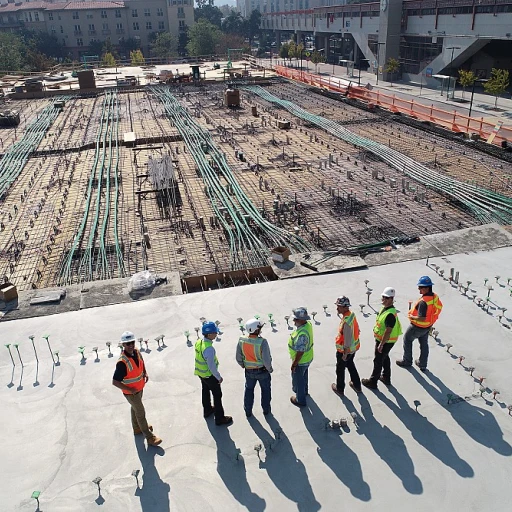Understanding Candidate Experience
Enhancing the Recruitment Environment
The candidate experience is more than just a series of steps in the recruitment process. It reflects the overall sentiment candidates have after interacting with an organization during their job application journey. This experience significantly influences their perception of the company's culture, affecting the quality of hires and the broader business environment.
Candidates are often faced with diverse questions aimed at assessing their suitability, including leadership interview questions designed to gauge key skills such as communication and decision making. Effective questioning helps identify how a candidate might fit within the team and leadership dynamics, ultimately impacting the organization's success.
On one hand, interviewers are tasked with striking the right balance between evaluating skills and creating a positive environment. This requires an understanding of different leadership styles and ensuring that the interview questions are fair and insightful. On the other hand, candidates provide answers — sometimes sharing examples tied to their past roles — which give insights into their problem solving and feedback handling capabilities.
A candidate's experience benefits greatly from a clear framework of expectations, transparency in communication, and timely feedback. For instance, when discussing constructive feedback, it's essential to consider how the candidate approaches similar situations and how they interact with team members. Their ability to lead a team, use effective communication, and maintain life balance are all facets that might be explored.
As recruitment continues to evolve, it’s crucial for organizations to craft and refine their leadership interview processes. Embracing a candidate-centric approach not only helps in talent acquisition but also builds a strong employer brand and helps create a work environment where team members thrive. When designed effectively, these questions—and the manner in which they are asked—play a significant role in not only assessing candidates but also shaping their impression of the company. For more insights on crafting questions that improve recruitment practices, refer to the essentials of 360-degree assessment questions.
An improved candidate experience contributes directly to a healthier workplace culture and, ultimately, organizational success.
The Role of Leadership in Candidate Experience
The Influence of Leadership in Creating a Positive Interview Atmosphere
Understanding the pivotal role of leadership in the candidate experience goes beyond evaluating technical skills. In a leadership interview, the environment should be welcoming and reflective of the company's values, creating an atmosphere where candidates feel comfortable and valued.
Effective leaders set the tone for the entire interview process, promoting an atmosphere where candidates are encouraged to demonstrate their skills, showcase their problem-solving abilities, and share real-life examples. By asking insightful questions, leaders can facilitate open communication and encourage candidates to describe times they have demonstrated leadership skills. These exchanges not only offer candidates the chance to highlight their abilities but also provide interviewers with a deeper understanding of how a candidate might fit within the team.
Additionally, providing constructive feedback and engaging candidates in discussions about common leadership and decision-making situations can offer valuable insights into their leadership style. For instance, asking candidates to share examples of how they have led a team or handled a challenging situation allows them to exhibit their leadership skills and adaptability. This exchange not only gives candidates a voice during the interview but also helps build a positive perception of the company’s leadership culture.
For those looking to craft more inclusive interview questions that tailor to diverse candidates, refer to our comprehensive guide on
crafting inclusive interview questions for diverse candidates. This resource provides further insights into formulating questions that can improve candidate engagement and promote a diverse and inclusive workplace.
Key Attributes of Effective Leadership Interview Questions
Attributes That Define Effective Leadership Questions
Crafting effective leadership interview questions is essential in evaluating a candidate's potential to thrive within your organization's unique environment. To achieve this, it's crucial to focus on certain attributes that these questions should possess. Below, we delve into the key elements that form the backbone of assessing leadership ability during interviews.
- Situational Relevance: Effective leadership questions often revolve around real-world scenarios where candidates can share examples from their experiences. Ask candidates to describe a time when they had to navigate a challenging team situation, showcasing their problem-solving and decision-making abilities. This approach reveals how they might lead a team under similar circumstances in your business.
- Focus on Results Orientation: Leadership skills are inherently tied to a candidate's ability to drive results. Questions should be designed to gauge how effectively a candidate can set and achieve goals, as well as their capacity to learn from failures. For instance, asking a prospective leader to discuss a project where they were required to balance time, deliverables, and team management can provide insights into their organizational skills and life balance strategies.
- Encouragement of Self-Reflection: Questions that encourage candidates to reflect on their leadership journey can provide a window into their growth. Inquire about a situation where they received constructive feedback and how it influenced their management style. This helps ascertain their ability to adapt and thrive, essential traits for a positive leadership environment.
- Assessment of Communication Proficiency: Communication is a cornerstone of effective leadership. Interview questions should assess how well candidates communicate goals, provide feedback, and align team members towards a common mission. For example, understanding how a candidate led a team through a transitional phase can offer significant insights into their communication prowess.
- Examination of Team Dynamics: The ability to build and maintain a cohesive team is a hallmark of great leadership. Questions should target a candidate's experience in handling diverse team members and fostering an inclusive work culture. This evaluates their interpersonal skills and capacity to cultivate a supportive team environment.
By prioritizing these attributes, leadership interview questions can be crafted effectively to align with your organization's specific needs. To further enhance the pre-screening interview process, refer to this
resource for more detailed insights.
Common Pitfalls in Leadership Interviews
Identifying Common Mistakes in Evaluating Leadership Interviews
In the midst of leadership interviews, both interviewers and candidates can fall into pitfalls that may impact the experience negatively. Understanding and addressing these common issues is essential in making the leadership interview process more effective.
Firstly, unclear or ambiguous questions can disrupt the flow of the interview. It's important to construct questions that are specific and relevant to the leadership skills needed for the role. Questions that lack clarity can confuse candidates and hinder them from providing concise, well-thought-out answers. To avoid this, ensure your questions are clear and focus on key leadership attributes such as problem solving and decision making.
Another pitfall lies in neglecting to tailor questions to different leadership styles. Considering the leadership style pertinent to your organization helps in framing questions that are relevant and insightful. For example, if your business values transformational leadership, an example question could be: "Can you describe a time when you inspired team members to reach their full potential?" Tailoring questions in this way provides a more comprehensive understanding of a candidate's alignment with your company’s culture.
Additionally, some interviewers make the mistake of overlooking the importance of follow-up questions. Follow-ups help in gaining deeper insights into a candidate's leadership experiences. They allow the interviewer to explore the 'why' and 'how' behind a candidate's initial response, offering a fuller picture of their leadership abilities. Through follow-ups, one can learn about their approach to life balance and their effectiveness in managing team dynamics during challenging times.
An often underrated aspect is the feedback process post-interview. Constructive feedback is crucial, not only for the candidate's personal growth but also in enhancing the candidate experience overall. Companies should provide positive, actionable feedback, even for unsuccessful candidates, as it reflects the organization's commitment to nurturing talent and maintaining strong relations with potential future team members.
Lastly, ensure that the interview environment is conducive to effective communication. Candidates should feel comfortable sharing examples of their leadership experiences openly, without fear of being judged or misunderstood. This fosters a positive atmosphere where candidates can demonstrate their true potential.
Addressing these aspects is fundamental to crafting a successful leadership interview process that benefits both the organization and candidates, ultimately leading to successful leader recruitment.
Crafting Questions for Different Leadership Styles
Tailoring Questions to Accommodate Varied Leadership Approaches
In the quest for identifying adept leaders, it is paramount to appreciate the diversity within leadership styles. Crafting questions that resonate with these distinct styles can significantly impact the overall candidate experience during leadership interviews. Here are some strategies to consider:
- Transformational Leadership: Ask questions that encourage candidates to showcase their ability to inspire and motivate team members towards shared goals. For example, "Can you describe a time when you transformed a challenging work environment into a positive one?" This question allows candidates to highlight their skills in fostering a collaborative team spirit while addressing problem-solving tasks.
- Transactional Leadership: This style relies heavily on structured tasks and conditional rewards. Questions should probe decision-making and performance management. An effective question might be, "Share an example of how you used constructive feedback to enhance a team member's performance." The answer should reflect the candidate’s ability to manage expectations and reward accomplishments.
- Servant Leadership: When focusing on servant leadership, consider questions like, "Describe a situation where you prioritized your team’s needs over your own to achieve a business objective." Such questions help identify candidates who prioritize empowering team members and exhibit servant leadership qualities.
- Situational Leadership: To evaluate adaptability, ask candidates how they would adjust their leadership style in varying scenarios. For instance, "How would you lead your team in a high-pressure situation different from your everyday management style?" Responses should reveal flexibility and a keen understanding of team dynamics.
Tailoring leadership questions to diverse styles not only uncovers a candidate’s adaptability and strengths but also reflects an understanding and appreciation for varied approaches to leadership. Additionally, this method invites candid and comprehensive responses, enriching the assessment process.
Evaluating Responses to Leadership Questions
Assessing Candidates' Leadership Capabilities Through Their Responses
Evaluating responses to leadership interview questions is a critical step in identifying potential leaders who can drive team success and positively impact the business. This section outlines various techniques to effectively gauge candidates' leadership skills and determine their suitability for your organizational environment.
One of the most important aspects of evaluating answers is to consider how candidates demonstrate their decision-making and problem-solving skills. Listen for examples of past experiences where they describe a time they led a team or navigated complex situations. You can ask follow-up questions to understand their approach to providing constructive feedback to team members, as this is a key part of effective leadership.
Engage candidates in discussions about their leadership style to determine how they align with your company's culture. Inquiring about a specific example time where they had to adapt their style to suit different team dynamics or work with diverse groups can provide insight into their flexibility and communication skills.
Consider how candidates explain their management capabilities and their ability to foster a positive team environment. Seek specific examples where they led a team and achieved successful outcomes. An ability to share examples of maintaining work-life balance while still achieving business objectives is another sign of a well-rounded leader.
Finally, it's crucial to observe how candidates reflect on past feedback experiences. Candidates who demonstrate a willingness to learn from feedback and adapt their leadership approaches are likely to thrive within your organization. By carefully analyzing these responses, interviewers can better discern which candidates possess the essential leadership skills needed to lead teams effectively.














